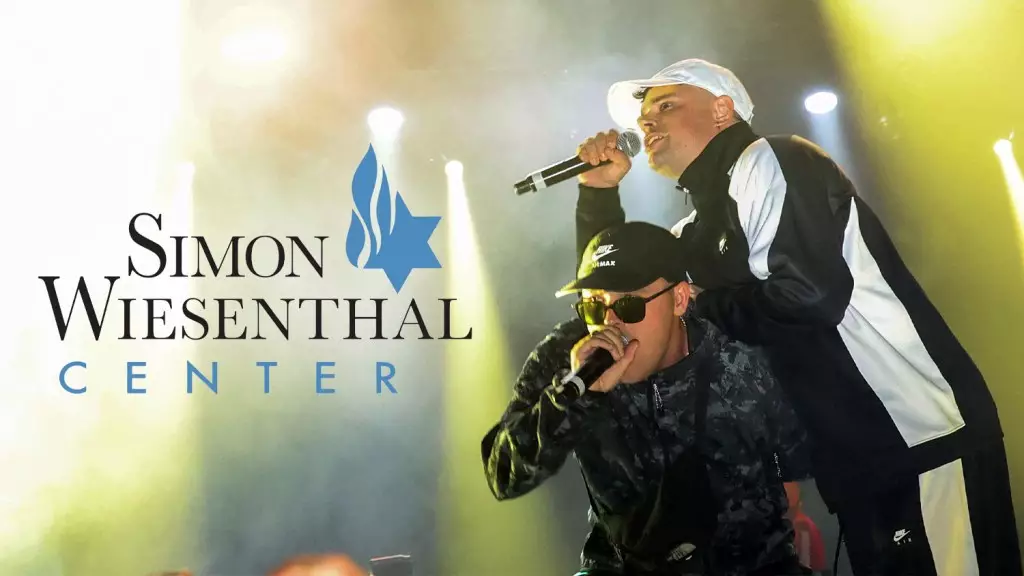At the recent Coachella festival, the Irish hip-hop group Kneecap made headlines not for their musical talents but for their incendiary message, boldly declaring “F*ck Israel, Free Palestine” during their performance. The provocative outburst drew immediate backlash, particularly from the Simon Wiesenthal Center, a prominent Jewish human rights organization. The event underlined an increasingly alarming trend where cultural platforms are utilized not to foster connection but to escalate divisive rhetoric and further entrenched viewpoints.
Kneecap, already known for their politically charged lyrics, opted to amplify their criticism of Israel amidst an already volatile backdrop—one marked by the ongoing Israeli-Palestinian conflict. Activating a politically charged message in such a high-profile context raises significant ethical questions. Is such a statement a legitimate exercise of free speech, or does it reflect a troubling insensitivity to the real human suffering on both sides? The Wiesenthal Center’s CEO, Jim Berk, expressed disappointment at the band’s choice to provoke hatred instead of addressing the need for empathy.
The Music-Festival Paradox
Music festivals are traditionally thought of as spaces for joy and togetherness, where diverse communities converge to celebrate art. In highlighting their grievances against Israel during such an event, Kneecap not only risks alienating listeners who may support peace but also contributes to a larger narrative that emphasizes dichotomies rather than dialogue.
Berk’s insistence that “music should bring people together and spread empathy, not hate” resonates deeply. The tragedy of modern art as a political vehicle is that it often simplifies complex issues into digestible sound bites. While artists like Kneecap have every right to voice their perspectives, the implications of their messages can sow seeds of division rather than promote meaningful discussion. The choice of venue matters, as Coachella should be a sanctuary for artistic expression rather than a battleground for clashes between ideological opponents.
A Question of Responsibility
The Wiesenthal Center’s outreach to both Kneecap and Coachella organizers was not merely a condemnation of the performance; it was an invitation for reflection and dialogue. Berk’s proposal for an educational conversation underscores the necessity for artists to recognize the power of their platforms. The potential consequences are profound: inflammatory statements can lead to radicalization on all sides, exacerbating the already entrenched divides in society.
Moreover, the insistence on projecting their statements boldly onto screens—certainly an impactful visual—instead of fostering constructive dialogue raises questions about the band’s understanding of their role as artists. Are they wielding their influence for genuine cause, or are they getting lost in the theatrics of provocation? There’s an undeniable allure in being provocative; however, it often distracts from the urgent need for effective discourse.
Tragic Irony and Cultural Reflections
In an era where music has the potential to unify disparate groups, it is deeply ironic that a band would use their platform to incite rage rather than constructive conversation. Reference points about the tragic repercussions of conflict—like the October 7 attacks in Israel or the aftermath in Gaza—should evoke empathy and a desire for peace instead of rallying cries for animosity.
Art—and by extension, music—should strive to be a bridge. Yet, Kneecap’s approach serves as a reminder that the lines between art and warfare can easily blur, particularly when artists choose sides rather than seeking common ground. The response from fellow artists, including pro-Palestinian sentiments expressed by major acts like Green Day, suggests that the festival atmosphere is becoming a cacophony of conflicting ideologies rather than a chorus for humane understanding.
The Broader Implications
The Coachella incident reflects not only the division within the music community but also a societal rift that runs deeper than mere performances. As conflict persists in regions like the Middle East, musicians are confronted with a recurring dilemma: should they integrate their political beliefs into their art, or prioritize the unifying potential of music? The stakes are high, as artists grapple with the impact of their statements on an audience that spans diverse backgrounds and opinions.
Ultimately, while freedom of speech is a fundamental right that must be upheld, the vital challenge remains. How can artists wield their voices to inspire dialogue and mutual understanding, rather than perpetuate cycles of conflict and distrust? This question lingers long after the music fades, urging artists to remember that their words have the potential to heal or harm.
